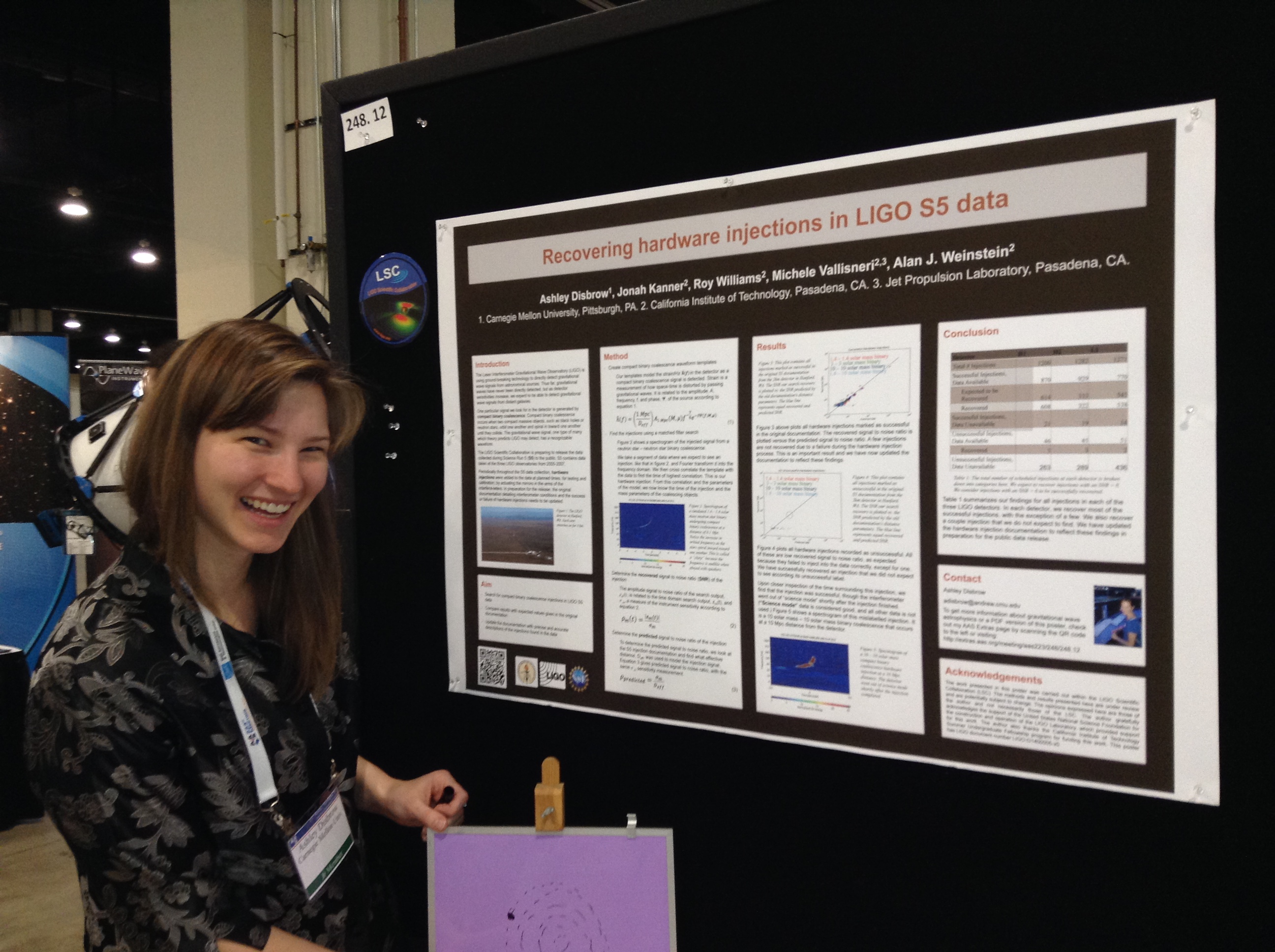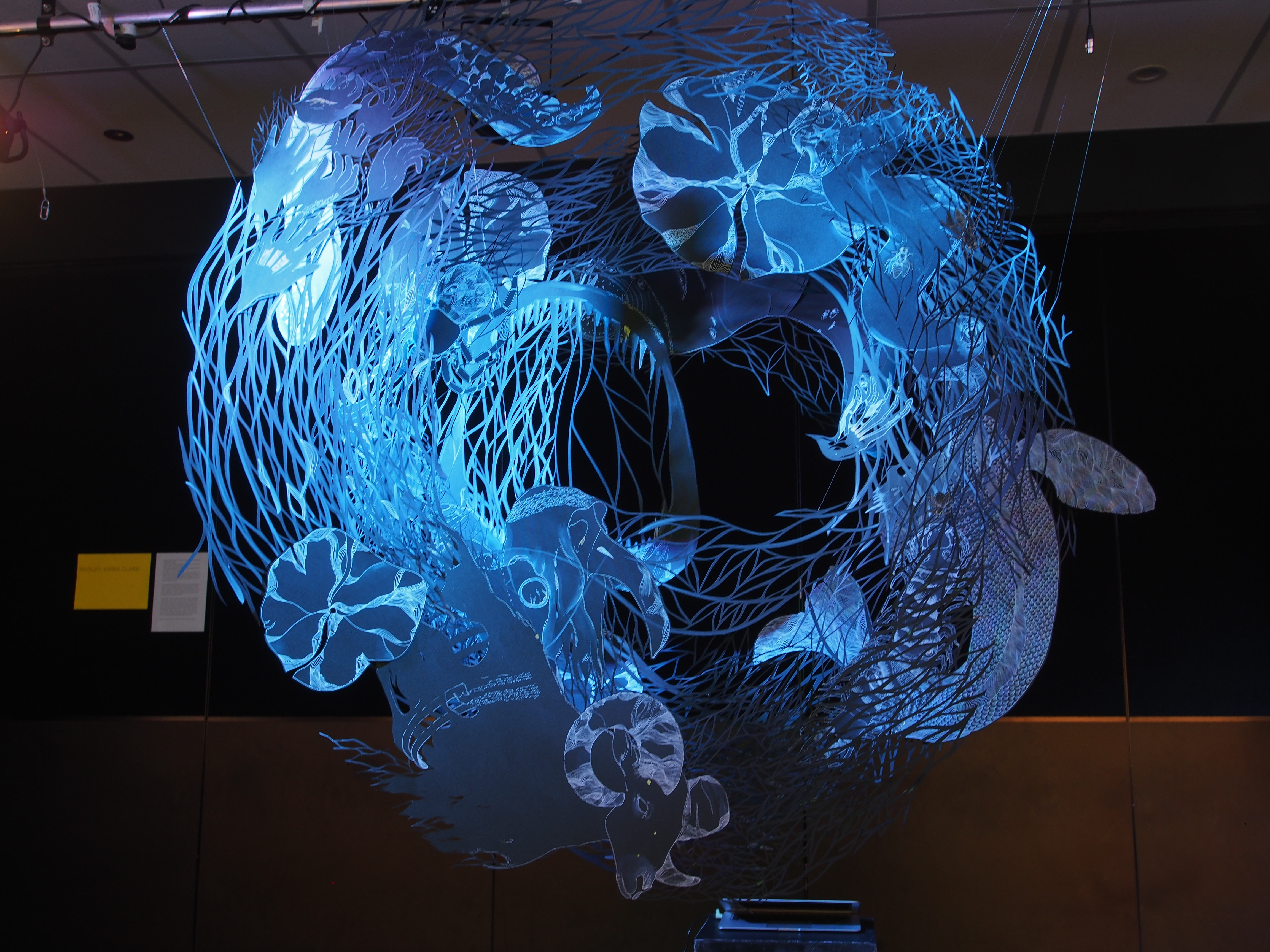Projects with GWOSC data
Some examples of projects using GWOSC data are shown on this page.
Listing a project here does not imply endorsement by LIGO Laboratory, the LIGO Scientific Collaboration or the Virgo Collaboration.
If you have completed a project with GWOSC data, please let us know!

Student Ashley Disbrow presents her work at the 2014 American Astronomical Society meeting in Washington, DC.

Student Emma Wadley created the installation art, titled Void (2016), shown above. Her artist statement includes this description: "I have used black paper to represent fear through the colour associated with death, shadows and the deepest nights ... The addition of light creates an eerie iridescence and the soundscape aims to unnerve and intrigue through otherworldly noise of Gravitational waves and the Mariana Trench."
Scientific Publications
Below are the most recent publications citing GWOSC, based on a query to INSPIRE HEP.
1) Relativistic Tidal Dissipation and the Gravitational-wave Signal of a White Dwarf Orbiting an Intermediate-Mass Black Hole
Yang Yang, Leif Lui, Alejandro Torres-Orjuela, et al.
2) Beyond Gaussian Assumptions: A new robust statistical framework for gravitational-wave data analysis
Argyro Sasli, Minas Karamanis, Nikolaos Karnesis, et al.
3) Pulsar Discoveries from the TRAPUM UHF Survey of Fermi-LAT Sources
Tinn Thongmeearkom, Colin J. Clark, Rene P. Breton, et al.
4) GW-FALCON: A Novel Feature-Driven Deep Learning Approach for Early Warning Alerts of BNS and NSBH Inspirals in Next-Generation GW Observatories
Grigorios Papigkiotis, Georgios Vardakas, Nikolaos Stergioulas
5) Dark matter distributions around extreme mass ratio inspirals: effects of radial pressure and relativistic treatment
Yang Zhao, Yungui Gong
6) Measurement prospects for the pair-instability mass cutoff with gravitational waves
Matthew Mould, Jack Heinzel, Sofia Alvarez-Lopez, et al.
7) Covariant eigenmode overlap formalism for gravitational wave signals in electromagnetic cavities
Jordan Gué, Tom Krokotsch, Gudrid Moortgat-Pick
8) Gravitational Raman Scattering: a Systematic Toolkit for Tidal Effects in General Relativity
Mikhail M. Ivanov, Yue-Zhou Li, Julio Parra-Martinez, et al.
9) Searching for gravitational waves from compact binary mergers powering long gamma-ray bursts during LIGO-Virgo-KAGRA's O3 run
Mallika R. Sinha, Teagan A. Clarke, Qifang Zhang, et al.
10) Cosmographic parameters from current and next-generation gravitational wave detectors
Jonathan Morais, Rodrigo Gonçalves, Jailson Alcaniz
11) Impact of Higher-Order Modes on Eccentricity Measurement in Binary Black Hole Gravitational Waves
Honglue Tang, Jinzhao Yang, Baoxiang Wang, et al.
12) Testing the wormhole echo hypothesis for GW231123
Qi Lai, Qing-Yu Lan, Zhan-He Wang, et al.
13) SED and Galactic kinematic diagnostics for dormant BH/NS binary candidates
Qian-Yu An, Wei-Min Gu
14) Rethinking Resonance Detectability during Binary Neutron Star Inspiral: Accurate Mismatch Computations for Low-lying Dynamical Tides
Alberto Revilla-Peña, Ruxandra Bondarescu, Andrew P. Lundgren, et al.
15) Cosmological Budget of Entropy from Merging Black Holes
Siyuan Chen, Karan Jani, Thomas W. Kephart
16) RNLE: Residual neural likelihood estimation and its application to gravitational-wave astronomy
Mattia Emma, Gregory Ashton
17) Systematic Biases in Gravitational-Wave Parameter Estimation from Neglecting Orbital Eccentricity in Space-Based Detectors
Jin-Zhao Yang, Jia-Hao Zhong, Tao Yang
18) Deep Search for Joint Sources of Gravitational Waves and High-Energy Neutrinos with IceCube During the Third Observing Run of LIGO and Virgo
R. Abbasi, M. Ackermann, J. Adams, et al.
19) Quasinormal modes and greybody factors of black holes corrected by nonlinear electrodynamics
Jie Liang, Dong Liu, Zheng-Wen Long
20) Constraining Hamiltonians from chiral effective field theory with neutron-star data
Cassandra L. Armstrong, Brendan T. Reed, Tate Plohr, et al.
Other Projects
GWeasy: Surfing Spacetime’s Waves
Software tools for GW data by Shantanusinh Parmar
Student projects at SUNY New Paltz (Starting in 2021)
Student projects mentored by Eric Myers
Final papers: Spy Hill Research
Pioneer Academics student projects (2015-2021)
Student projects mentored by Eric Myers
Final Papers: Spy Hill Research
Effect of Low Frequency Noise in Detection of Gravitational Waves
Baisakhi Mitra
Gravitational Wave Events (iPhone App)
Peter Kramer
Evidence for Small-Strain Burst Sources Proliferating in Enhanced-LIGO Time Series Data
Stanley W. Wong and Baokun Gu Report on Google Docs
Calculating detection ranges for binary black holes
Bassel Heiba Code on github
GW150914 Kaggle Projects
Created by Elena Cuoco GW150914 data in Kaggle
Online Course - LIGO: Detecting Gravitational Waves
Created at Sonoma State University by Lynn Cominsky SSU LIGO Courses | 2016 Course
Art Installation: Void
Emma Wadley See photo above
Modified LIGO data analysis notebook
Valentin Baillard Azure | mybinder | github
Physics From Planet Earth homework problems
Joe Amato and Enrique (Kiko) Galvez See Gravitational Radiation 2 and Gravitational Radiation 3
Non-Gaussian noise and data analysis of laser interferometric gravitational wave detectors
Takahiro Yamamoto, Ph.D. Thesis See JGW-P1605355
Gravitational Wave Detection in the Introductory Lab
Lior M. BurkoGeorgia Gwinnett College, See arxiv:1602.04666
Pioneer Academics student projects
Projects mentored by Eric Myers Final papers: Jinghong Liang | William Li
Searching for Compact Binaries in LIGO Data
Shannon Wang Date Completed: September 2014 Report: Paper
Recovering S5 Burst Injections
Alexander Cole Date Completed: May 2014 Presentation: Paper | Slides
S5 Data Time Dependence of Duty Cycles and Spacetime Detection Volumes
Gary LaMotte Date Completed: April 2014 Presentation: Slides
Recovering Hardware Injections in LIGO S5 Data
Ashley Disbrow Date Completed: September 2013 Presentations: Poster | Slides
Share your own GWOSC data project
For help getting started on a GWOSC data project, or if you have completed work that you would like to share, please contact the GWOSC team.
Please remember to cite or acknowledge GWOSC if using any products from this web site.
